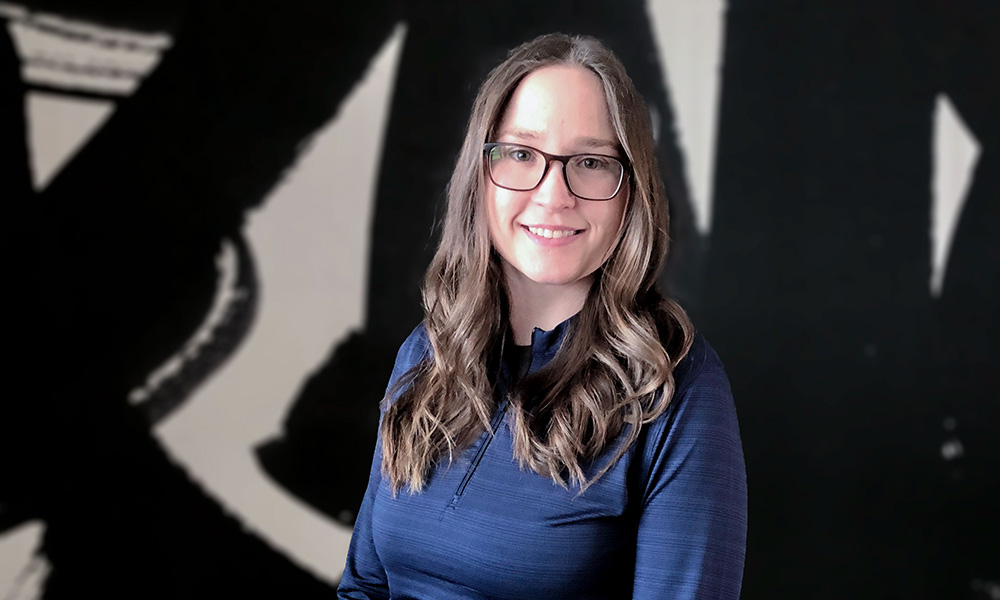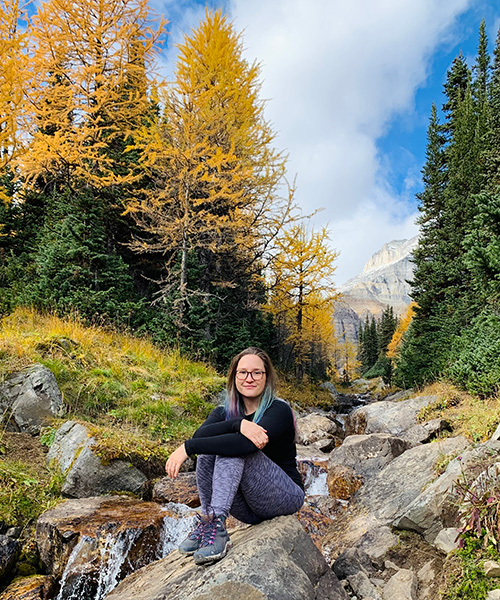Environment & Sustainability, People, Research, Student Profile
How humans and climate change affect our environment
May 4, 2023

About
Name
Melanie Dickie
Role
Doctoral student
UBCO Doctoral Student Researcher of the Year, 2023
Faculty
Irving K. Barber Faculty of Science
Program
Biology
Campus
Okanagan (Kelowna, BC)
Education
Master of Science, Biological Sciences, University of Alberta
Bachelor of Science, Biology/Ecology, University of Ottawa
Hometown
Ottawa Valley, Ontario
“Doing my PhD at UBC Okanagan has given me the room to push my research further. I can research questions in broader ecological theory that can be used by decision makers.”
AS A SCIENTIST, MELANIE DICKIE FIRMLY BELIEVES in the power of data to inform decisions. As a person, she enjoys spending time in the outdoors and is passionate about caring for the environment. The combination of these personal feelings and her scientific interest come together to inform her research career on the pathways that link human-caused landscape changes to caribou—a threatened species in Canada.
Dickie’s passion for preserving and restoring ecosystems in Canada’s north stemmed from fieldwork she undertook in Nunavut during her undergraduate degree.
“It was during that trip I fell in love with the idea of how humans and climate change impact ecosystems, and how these factors combine to influence the natural world we live in,” she says.
Following her undergraduate degree, Dickie completed a master’s degree at the University of Alberta and then moved into the not-for-profit sector with the Alberta Biodiversity Monitoring Institute (ABMI). At ABMI, Dickie continued to dedicate her work to providing scientifically credible information to support land use and management decisions.
“Melanie has a knack for engaging with scientists, Indigenous communities and resource managers. She has excelled at cultivating an inclusive and curious environment within her research community.”
– Dr. Adam Ford
While working at ABMI, Dickie stayed closely connected to the academic world, attending conferences and interacting with researchers on social media platforms. One researcher that she found herself interacting with often was UBC Okanagan’s Dr. Adam Ford.
“I found myself and Dr. Ford on very similar threads on social media—threads about how humans are modifying the landscape, how data is used to support transparent decision making, and the role of Indigenous communities in the management of systems,” says Dickie.
A conversation at a conference eventually led to the development of Dickie’s doctoral research at UBC Okanagan. Dr. Ford’s experience working with different ecosystems and his focus on food webs presented a new way of approaching her research.

Melanie Dickie.
Dickie started her doctorate in biology at UBC Okanagan in 2020, under the supervisor of Dr. Ford in The Wildlife Restoration Ecology Lab (WiRE Lab). Through her PhD research, Dickie is exploring how human land use and climate intersect to influence the abundance of white-tailed deer. These animals are expanding deeper into caribou range where they were previously less abundant, and now act as a food source to bolster predator populations like wolves. This poses a threat to caribou, which do best in areas with low populations of predators.
Dickie’s research explores questions of what management interventions are available, how effective they are, and how they might be prioritized across the landscape to make the biggest impact for caribou. “Doing my PhD at UBC Okanagan has given me the room to push my research further,” she says. “I can research questions in broader ecological theory that can be used by decision makers.”
Dickie believes that research is about getting information to the right people and building relationships to ensure that information is used to make a difference. She hopes that her research will provide decision-makers with the tools they need to effectively manage caribou populations.
“Melanie has a knack for engaging with scientists, Indigenous communities and resource managers,” says Dr. Ford. “She has excelled at cultivating an inclusive and curious environment within her research community.”
Following the completion of her doctorate, Dickie sees herself working alongside academics, government and Indigenous communities for decades to come, continuing to reduce society’s effect on natural systems.